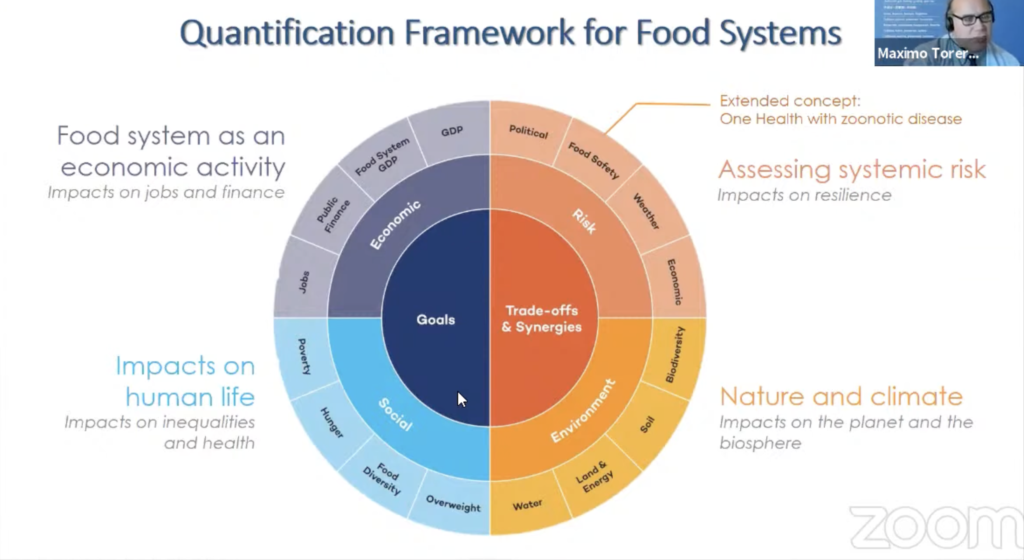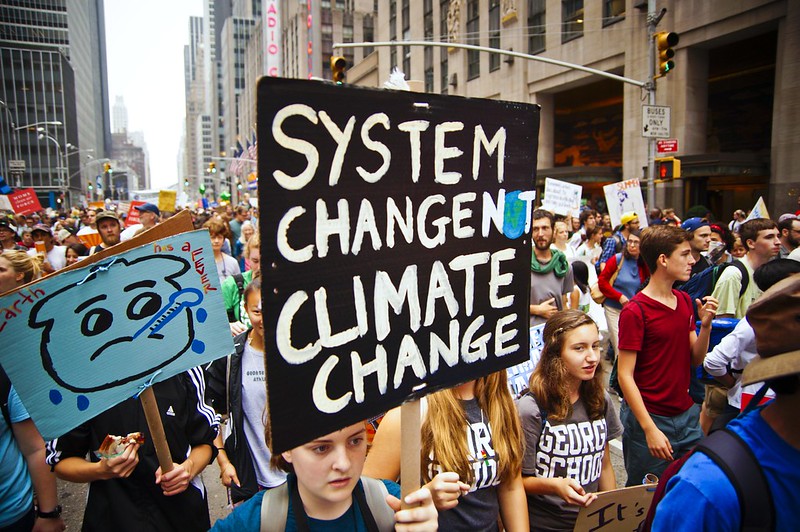On Wednesday, October 20th the Irish Forum on International Agricultural Development (IFIAD) hosted its annual conference. The event took place about a month after the United Nations Food Systems Summit, and a little more than a week before COP26 will begin in Glasgow. Much of the event centered around the action tracks and main takeaways from the Food Systems Summit and thinking about how these takeaways will feed into COP26. Three key issues raised were the importance of a systems-level approach to agri-food systems and climate challenges, the need for financing, and national strategies and follow-through on commitments. Many of the speakers at the conference remarked on the systems-level approach at the summit and the importance of a multi-sectoral and collaborative approach. Maximo Torero Cullen, the Chief Economist of the Food and Agriculture Organization (FAO), highlighted the systems approach in his presentation on the summit as seen in the photograph below. The issue of financing was another common theme. Sinead Mowlds, an International Development Consultant and Research Affiliate at Cambridge, spoke about the importance of public financing in showing farmers that they will be supported in the transition to sustainability, and how public financing is one way that countries can demonstrate clear action on their commitments made at the summit. Donal Brown, Associate Vice-President, Programme Management Department, at IFAD, spoke on the importance of getting financing down to smallholder farmers for implementing adaptation strategies. Dr. Ana Maria Loboguerrero, Research Director of Climate Action for the Alliance of Bioversity International and International Center for Tropical Agriculture (CIAT) also addressed the need for financing innovation around nature-based solutions and closing the innovation gap. Lastly, there was a discussion around action and accountability at the national level. Some countries have failed to demonstrate follow-through on previously made commitments going into COP26. Mark Howden, the Director of the Institute for Climate, Energy & Disaster Solutions at The Australian National University, pointed out that whilst a very large number of countries made commitments from the Paris Agreement to reduce emissions we are still seeing emissions on the rise globally. As Dr. Sinead Walsh, Ireland’s Climate Envoy, so aptly put it, domestic politics are where the rubber hits the road in terms of the implementation of these food and climate goals.

Trust and inclusion were identified as areas of polarisation at the conference. With a multisectoral approach to food and climate-related issues, there are bound to be different priorities and opinions on how best to move forward. There was a discussion on tension from the civil society actors around the involvement of the private sector in the Food Systems Summit. Maximo Torero Cullen also touched on the fact that there were disagreements amongst science groups at the Food Systems Summit. Sinead Mowlds and Tom Arnold, the Irish Government’s Special Envoy for Food Systems, discussed the involvement of large-scale private sector actors in the development of Ireland’s Food Vision 2030 Strategy and the response from the environmental sector. While there is no doubt that involvement is needed from the public, private, health, environmental, and civil society sectors tension remains surrounding the decision-making process and who has a seat at the table. Although there is always room to improve transparency and inclusivity, it is crucial that disagreements about the strategic and decision-making process do not detract from the urgency for action.

One issue that will continue to be discussed more in-depth at COP26 that was not discussed at the IFIAD conference is the role of the energy and transportation sectors. While these sectors are no doubt intertwined with our agri-food systems, different sectors and agendas sometimes compete for attention at events like COP and at the national strategic level. For example, with the infrastructure package in the United States, which emphasizes electric vehicles, public transport, and power infrastructure that can facilitate the expansion of renewable energy, one wonders how much political will and public financing remains for legislation more directly related to agri-food systems. It will be interesting to see how large of a role food systems play in COP26 conversations and national commitments in comparison to other sectors and how possible trade-offs will be addressed. Additionally, both the UN Food Systems Summit addressed the importance of marine ecosystem preservation, yet ocean health and aquatic foods were not major topics of conversation at the IFIAD conference. Going into COP it will be interesting to see what commitments countries will make and what effect it will have on coastal and fishing communities.
More Information:
Listen to the podcast series “Laying Down Tracks” about the action tracks from the UN Food Systems Summit: https://www.un.org/en/food-systems-summit/laying-down-tracks
Watch this video on Ireland’s Food Vision 2030 Strategy:
Read more on the Food Vision 2030 strategy and how it has been received: https://www.irishtimes.com/life-and-style/food-and-drink/ireland-s-new-food-strategy-targets-quality-and-doubles-down-on-sustainability-1.4640463
Read the statement from the United States on the Food Systems Summit: https://www.whitehouse.gov/briefing-room/statements-releases/2021/09/23/chairs-summary-un-food-systems-summit/
Read this article from the World Economic Forum on COP26 and the ocean: https://www.weforum.org/agenda/2021/05/cop26-best-opportunity-ocean-finance-climate-change-mitigation-adaptation/